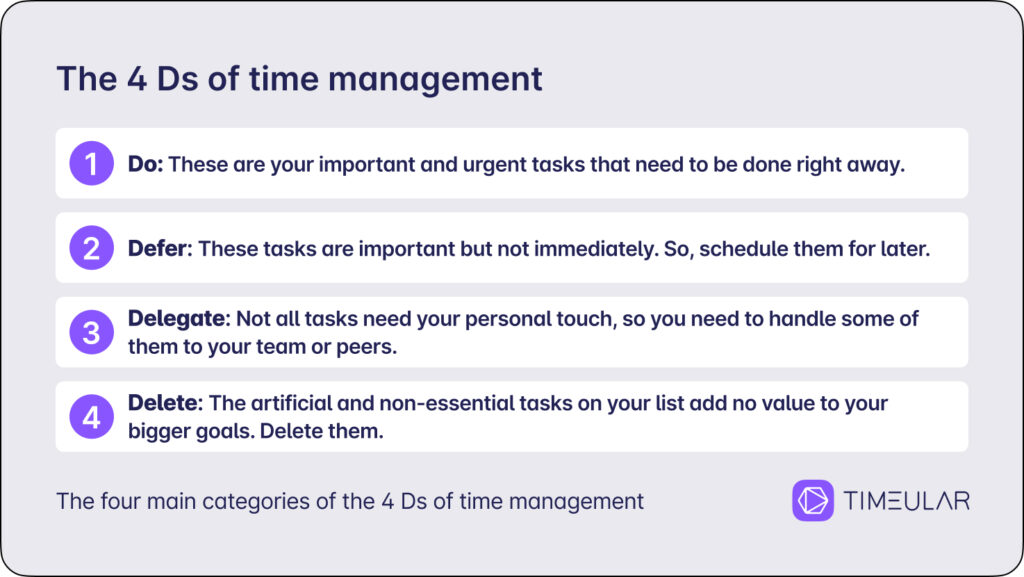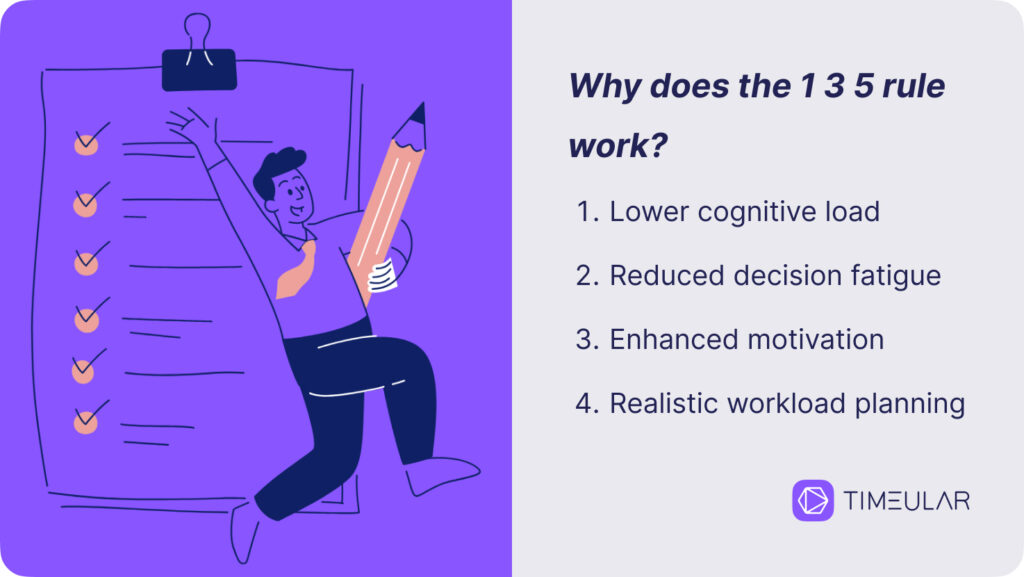What number of of your days find yourself with you feeling such as you didn’t progress with work apart from placing out fires? In case your reply is “I can’t even rely – too many days,” then you definately want a structured method to arrange your duties.
The 4Ds of time administration aid you cluster your duties by their urgency and significance after which prioritize them in a strategic method.

What are the 4Ds of time administration?
The 4 Ds of time administration is an easy framework that helps you categorize and prioritize duties primarily based on 4 important classes: Do, Defer, Delegate, and Delete. In different phrases, you study to establish duties that have to be accomplished instantly, duties that may be delayed till later, and others that may be delegated to your friends or deleted altogether.
One of the best half about it’s that you simply’re gaining readability over your work and escaping emotions of overwhelm or poisonous productiveness.

TLDR: The 4 Ds of time administration
Let’s soar into the that means of the 4 classes of the 4 Ds of time administration. Be aware that I’ll offer you particular examples in the course of the article and tips on how to implement them.
- Do: These are your vital and pressing duties that have to be accomplished immediately, as these both block a undertaking’s progress or have exhausting deadlines looming on you.
- Defer: On this class, you discover the so-called “faux pressing duties.” That implies that these are vital and must be accomplished by you, however not instantly. So, deferred duties will be scheduled for afterward.
- Delegate: Not all duties want your private contact, so it is advisable hand over a few of them to your crew or friends so you may deal with the upper priorities.
- Delete: The fact is that we’re creating additional work to generally really feel helpful or as a result of we’re overcomplicating issues, however these may not add worth or align with our targets. So we have to delete all these non-essential duties.
💡 Professional tip: If in case you have problem with delegating or deleting duties, you need to study extra methods on tips on how to defend your vitality. You’ll see an enormous distinction in your productiveness ranges because it helps you regain time management.
The origin of the 4 Ds of time administration
The 4 Ds of time administration originate in productiveness and time administration theories popularized within the twentieth century. It was notably influenced by the idea of the time administration matrix created by the previous President of the USA, Dwight Eisenhower, in 1954, which, since then, was additional refined by productiveness specialists.
Why is the 4D framework helpful?
The 4 Ds work like a structured framework that helps you fight overwhelm and acquire readability on tips on how to method not solely your duties however your total workday. The 4 Ds offer you a extra environment friendly time administration course of and, by default, higher time administration expertise.
Right here’s why this framework is a game-changer:
- It eliminates determination fatigue: Your work is advanced sufficient – it is advisable make the most of your psychological capability to deal with your excessive-priority duties, not devour it on repetitive duties. The extra you consider your duties and tips on how to deal with them, the extra your capability to make selections decreases. The 4 Ds decrease overthinking.
- It fosters creativity and productiveness. By clearly defining what on a regular basis duties deserve your instant consideration and which of them will be put aside, you unlock psychological sources. This psychological bandwidth can be utilized to be extra artistic, progressive, and productive in your work.
- It brings a way of management: The 4 Ds flip your beforehand overwhelming workload right into a sequence of achievable steps. In flip, you are feeling extra assured and have extra peace of thoughts, versus being anxious in entrance of a chaotic to-do record.

Getting began with the 4 Ds of time administration
Let’s discover a strategic method of assessing your duties with this time administration approach and tips on how to distinguish between pressing however vital duties and non-urgent duties. Getting began with the 4 Ds is simpler than you would possibly suppose. Right here’s a step-by-step information which you could comply with:
1. Begin your day by making a process record
Write down every little thing it is advisable do, irrespective of how huge or small. At this stage, don’t filter or categorize actions, simply goal to jot them down.
As an example, your record would possibly embody duties like “making ready a pitch for a possible shopper,” “scheduling a one-on-one name,” “following up with one vendor,” or “responding to a shopper’s e mail.”
Be sure you have a whole stock so you may acquire a sensible image of what’s in your plate.
💡 Professional tip: If a process takes lower than 5 minutes and it’s vital, do it now, don’t procrastinate. The 1 3 5 rule of productiveness would possibly aid you implement this straightforward 5-minute rule.
2. Consider every process
When you’ve compiled your record, it’s time for process administration to emerge. Now, it is advisable fiercely assess all duties by significance and urgency.
A. Is it pressing and vital? → I’ll do it!
Assess if these duties have important penalties if delayed. As an example, you promised a possible shopper that you simply’d ship your provide or a shopper emailed you final night that the marketing campaign you’re operating for them isn’t performing in any respect – these are duties that don’t afford delays. In any other case, these could have unfavourable penalties. So, it is advisable prioritize them as quickly as potential.
B. Is it vital, however can it wait? → I’ll defer it!
Be aware which you could postpone duties on this class, however they’re important, too. Nonetheless, the distinction between “doing ASAP” to “deferred duties” is that the latter isn’t time-sensitive. As an example, should you’re a advertising content material supervisor, it is advisable create the technique for this quarter to ship it to your writers or manage recordsdata for a brand new undertaking that begins in per week. So, schedule these for later when you may dedicate centered time.
C. Can another person deal with this higher or quicker? → I’ll delegate it!
Some duties find yourself in your record generally for various causes, however it’s not necessary for them to stay in your record. As an example, should you’re pressed by a shopper pitch and there’s a gathering that may be held by somebody within the crew, deal with the coordination. It may be an ideal alternative for them to develop and so that you can keep deal with what’s pressing.
D. Does the duty add no actual worth? → I’ll delete it!
There are pointless duties which may appear vital at first look however don’t contribute to your targets. As an example, there are non-essential conferences that you may skip or spend time on low-impact social media updates. Be daring in eradicating these out of your record fully – these are stealing your time and are undoubtedly not pressing and vital duties.
| EVALUATE EACH TASK | INDICATORS | ACTION |
|---|---|---|
| Is it pressing and vital? | The duty: 1. has a deadline in the present day 2. considerably impacts a undertaking’s progress 3. has unfavourable penalties if not accomplished ASAP |
I’ll do it |
| Is it vital however not pressing? | The duty: 1. is important however not time-sensitive 2. will be scheduled for later 3. requires centered time to finish |
I’ll defer it |
| Can another person deal with this process? | The duty: 1. doesn’t want your experience 2. will be successfully accomplished by another person 3. includes routine or repetitive work |
I’ll delegate it |
| Does the duty add no actual worth? | The duty: 1. doesn’t contribute to your targets 2. is non-essential or low-impact 3. will be skipped with out penalties. |
I’ll delete it |
3. Prioritize, schedule, and assign precedence
When you’ve categorized your duties with the 4 Ds of time administration, it’s time to arrange and prioritize all of the duties.
Not all “Do” duties could have the identical stage of urgency, nor are all “Defer” duties equally vital. Take a second to investigate the relative significance and urgency of every process inside its class, and add them within the order it is advisable finalize them.
| CATEGORY | TASK EXAMPLE | PRIORITY | ACTION |
|---|---|---|---|
| Do | Submit shopper pitch by 5 PM | Excessive urgency and significance | Begin this instantly to hit the deadline and probably win a brand new shopper. |
| Do | Reply pressing emails | Decrease urgency however vital | Deal with this process after ending the high-priority ones within the “Do” class. It must be dealt with subsequent, as in any other case, it blocks progress on different tasks. |
| Defer | Draft subsequent month’s advertising marketing campaign | Essential however not time-sensitive | Schedule this process in a time block later within the week. It wants your supervisor’s funds approval, however you continue to have this week to finalize it. |
| Defer | Replace the crew handbook | Low urgency and long-term significance | Set a later deadline for this one because it doesn’t affect instant targets or deliverables. |
| Delegate | Routine information entry | Low significance and appropriate for others | Assign this process to a colleague or seek for an automatic instrument to deal with this quicker on Friday this week. |
| Delete | Non-essential assembly that would have been an e mail | Provides no actual worth | Politely decline or take away out of your schedule to focus in your most high-level duties. |
💡 Professional tip: Nonetheless struggling to say no some work or conferences, even when these are clearly within the unimportant duties class? I get you! One of the best factor you may study is tips on how to say no to work.
4. Assessment the way it’s going
Time administration isn’t a one-and-done exercise. It’s a relentless decision-making course of, and you need to regulate your time administration technique primarily based in your progress.
A time audit accomplished with an computerized time-tracking app simplifies your evaluation. You may carry out a fast audit on the finish of every week and assess the way you’ve frolicked on all of your duties. This fashion, you may reveal should you had an inclination to misplan or categorize duties wrongly or should you didn’t allocate sufficient time slots for advanced duties and different points.
In case you take into account it helpful, you may monitor the progress even twice per week. This helps you reshift your focus, reprioritize duties instantly upon want, or set priorities in a different way.
Do’s and dont’s in making use of the 4 Ds
For excellent outcomes in implementing the 4 Ds, it’s finest to remember some finest practices to maximise their effectiveness. Try this fast information when implementing this framework:
| DO’S | DON’TS |
|---|---|
| Do categorize duties objectively primarily based on urgency and significance | Don’t overthink process classes – fast selections are key to effectivity |
| Do delegate duties that others can deal with successfully | Don’t micromanage or take again duties you’ve already delegated |
| Do overview your process record usually and regulate as priorities shift | Don’t assume your preliminary categorization is ready in stone—adapt always |
| Do be daring about eliminating non-essential duties out of your record | Don’t maintain onto pointless, non-urgent duties out of guilt or worry of lacking out |
| Do pair the 4 Ds with instruments like time trackers or undertaking administration apps | Don’t rely solely on reminiscence or a chaotic process record – it defeats the aim of the system |
| Do deal with ending one class or process at a time | Don’t multitask or let distractions pull you away out of your prioritized work |
Cons of the 4 Ds of time administration
Even when the 4Ds is among the most effective methods, it has its fair proportion of execs and cons. All these rely on case by case, however listed here are some basic limitations:
- It requires self-discipline: To really profit from the 4 Ds, it is advisable apply it with consistency. It’s simple to fall again into previous habits of multitasking or hoarding duties out of worry of delegating or deleting, and also you’re undermining its effectiveness.
- It’s not all the time clear-cut: Some actions might not match into the 4 classes with precision, which might make it exhausting to categorize duties. With time, you’re studying to be quicker in deciding tips on how to categorize them, so it’s finest to present it time to get into full gear.
- It depends on belief for delegation: Significantly for delegating, it is advisable belief your friends or crew, and should you don’t, this could make it exhausting so that you can delegate. Furthermore, poor delegation or lack of follow-up can result in poor outcomes. Therefore, it is advisable ensure you’re studying tips on how to handle this course of.
- Deleting duties might really feel uncomfortable: Generally, having a pile of duties makes us really feel helpful, wanted, and productive. In any other case, you would possibly really feel responsible, which stops you from deleting them. It’s finest to develop your talent of figuring out what really brings the true affect.
- It might overlook long-term planning: The 4 Ds deal with categorizing and managing instant duties however don’t inherently handle long-term targets or strategic planning. You must ensure you have goal-setting frameworks or programs so that you don’t miss the larger image.
Begin taking management of your duties
As a last be aware, it’s vital to take into account that this could possibly be acknowledged as a easy methodology, however its effectiveness will be nice for anybody, from undertaking managers to entrepreneurs and in your private life.
If you wish to enhance your productiveness and management your personal time, the 4 Ds are an distinctive alternative for you and your undertaking’s life cycle progress. It’s additionally vital to grasp that this methodology may not swimsuit you, however you need to consider your choices first and take into account a trial run of the 4 D’s.
After getting shaped your opinions about it, you may resolve what’s finest in your particular case.
FAQs
Who advantages from the 4 Ds of time administration?
Anybody juggling a number of duties can profit from the 4 Ds, together with professionals, entrepreneurs, college students, and even busy dad and mom. It’s a flexible framework that helps anybody prioritize and handle their time extra successfully.
Can the 4 Ds of time administration be tailored for private use?
Sure, the 4 Ds will be simply utilized to private duties like family chores, health routines, meal planning, or managing household schedules. So don’t hesitate to make use of it for any specific process.
How do I resolve what to delegate?
You may delegate duties that don’t require your particular expertise or experience however will be successfully dealt with by another person. These duties are additionally stealing time out of your most vital and pressing duties. For instance, routine information entry, scheduling, or administrative duties are perfect for delegation.







